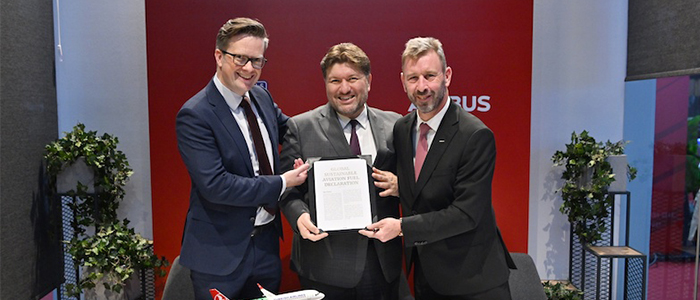Turkish Airlines continues its support for the development of Sustainable Aviation Fuels (SAF), which play a key role in reducing carbon emissions. The airline started to actively use SAF this year, emphasizing its importance by signing the Global SAF Declaration.
Global SAF Declaration is a collaboration between aviation, aerospace and fuel partners, to decarbonize sustainable aviation fuel. The aim of the declaration is to completely decarbonize SAF.
Turkish Airlines plans to increase SAF usage to the highest levels, in line with its technical, regulatory, safety and financial feasibility.
On the matter, Chief Investment and Technology Officer Levent Konukçu stated that by reducing emissions significantly with the inclusion of new generation aircraft to its fleet, operational optimisations and high-level fuel-saving applications, Turkish Airlines will continue its support and investment in sustainable aviation fuels.
Head of Airbus International and Chief Commercial Officer Christian Scherer said they too, are fully committed to developing a sustainable aviation industry, across the value chain, that will reduce the environmental impact of flying. He said that the Declaration supports exactly that and today, Turkish Airlines has responded to the call to join the initiative, signing up to work with all stakeholders in the journey towards zero-emission aircraft.
I am proud that Türkiye is demonstrating their commitment in this endeavour.
According to Rolls-Royce Chief Technology Officer Grazia Vittadini, working together with industry partners across the value chain to encourage the uptake of SAF is a key part of the Rolls-Royce sustainability strategy.
By signing this agreement, the airline has also given a clear signal that Türkiye is fully behind driving the momentum and collaboration necessary for a successful transition to a more sustainable future for global aviation.
Sustainable aviation fuel
Turkish Airlines started using sustainable aviation fuel for the first time in 2022 on the Istanbul Airport – Paris Charles De Gaulle route. It extended this usage to Paris, Oslo, Gothenburg, Copenhagen, London and Stockholm for one day every week. The airline also intends to increase the frequencies and destinations served with sustainable aviation fuel in the future. Sustainable aviation fuel records up to 87% decrease in greenhouse gas emissions compared to traditional kerosene fuel.
Additionally, Turkish Airlines also cooperates with universities to support biofuel research and development in order to reduce fossil fuel usage in aviation. In this regard, the Microalgae Based Sustainable Bio-Jet Fuel Project (MICRO-JET) project is currently ongoing with Boğaziçi University supported by TÜBİTAK – the Scientific and Technological Research Institution of Türkiye.
This project aims to use biofuel obtained from sustainable sources in their flights after engine tests carried out by Turkish Technic this year.
Check out Marhaba’s FREE e-Guides for everything you need to know about Qatar.







